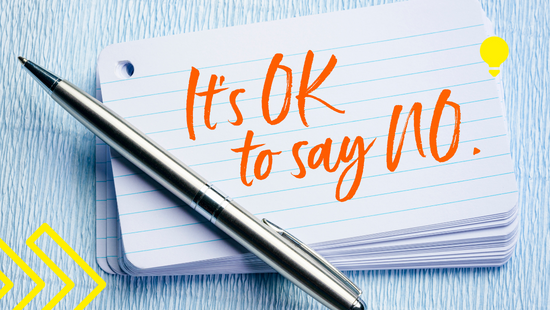16 October 2023

Introduction: Learning to Say “No”
Do you often find yourself saying “yes” to everything, even when you don’t want to or can’t handle the extra load? Learning to say “no” can be one of the most powerful things you can do for yourself! Saying no gives you control over your time and allows you to prioritize tasks that are most important to you.
When you take on too much, you risk burning out and not being able to accomplish anything effectively. Saying no helps you avoid this burnout and stay on top of your game. We all want to be liked and help others, but saying yes to everything can hurt us in the long run.
It’s tough to say no without feeling guilty or worrying about what others will think. However, saying no is not a sign of weakness. It can be the ultimate form of strength. When you learn to say no, you can create boundaries that protect your time, energy, and resources.
Saying no allows you to value and respect yourself and your needs. It can also help you build stronger, more authentic relationships by allowing you to be true to yourself. So, the next time someone asks you to take on another task or attend yet another meeting, don’t be afraid to say no. It might be tough at first, but in the long run, you’ll feel empowered and in control of your life.
Understanding the Consequences of Saying Yes
Saying no isn’t easy, but it’s important. We often find ourselves saying yes to things we don’t want to do or don’t have time for, which can lead to overcommitment, burnout, and strained relationships. So let’s discuss the consequences of saying yes too often, tips on training yourself to say no, the best ways to say no, and the importance of following through with your no.
Overcommitment can lead to burnout. We have a limited amount of time and energy each day, and saying yes to everything can leave us feeling exhausted and overwhelmed. It’s important to prioritize what’s important to us and say no to the rest. Trying to please everyone is a losing game. We can’t make everyone happy, and trying to do so will only lead to frustration and disappointment.
Trust me, I’ve been a people pleaser myself for far too long. Instead, focus on what’s important to you and let go of the need to please everyone else. Relationship strains caused by the inability to say no can have lasting effects. Saying yes to everything can lead to resentment towards others and ourselves. It’s important to set boundaries and communicate our needs to others to maintain healthy relationships.
Tips on How to Train Yourself to Say No
Now that we understand the importance of learning to say no, it’s time to explore how we can train ourselves to do it effectively. Saying no isn’t always easy, especially if you’re used to being a people-pleaser. But with a little practice, you can become a pro at it and establish healthy boundaries that prioritize your time and well-being. Here are some tips on how to train yourself to say no:
1. Identify Your Priorities
Before you commit to something, take a moment to assess whether it aligns with your priorities. Are you passionate about it? Will it add value to your life or career? Does it support your goals? If the answer is no, it’s time to decline the offer politely. By prioritizing what matters to you, you’re more likely to focus your time and energy on things that make you happy and fulfilled.
2. Practice Assertiveness
Assertiveness is the key to saying no confidently without feeling guilty or anxious. Avoid using phrases that soften the rejection such as “I’m sorry” or “maybe next time.” Instead, be direct and concise in your response. For instance, “Thank you for considering me, but I won’t be able to fit it in my schedule this time.” Remember that you’re in control of your decisions, and it’s okay to decline something that doesn’t fit with your values or interests.
3. Plan and Prioritize Your Time
Time is a precious commodity that shouldn’t be wasted on tasks that don’t bring you joy or fulfillment. That’s why it’s crucial to plan and prioritize your time effectively. Make a to-do list of the essential tasks you need to accomplish in a day or week and stick to it. Avoid multitasking as it can lead to burnout and decreased productivity. By managing your time wisely, you’re more likely to achieve your goals and say no to unnecessary distractions or commitments.
4. Be Honest and Respectful
Saying no doesn’t mean you have to be rude or disrespectful. It’s possible to decline an offer politely and respectfully while maintaining a positive relationship. Start by expressing gratitude for the opportunity and explaining why you have to decline. Use “I” statements to avoid sounding accusatory or defensive. For example, “I appreciate the offer, but I have too much on my plate right now.” Remember that it’s okay to say no, and you don’t need to apologize for prioritizing your time and well-being.
In conclusion, saying no can be a daunting task, but it’s essential for maintaining healthy boundaries and prioritizing your well-being. By identifying your priorities, practicing assertiveness, planning and prioritizing your time, and being honest and respectful, you can train yourself to say no effectively.
Remember that you’re in control of your decisions, and it’s okay to decline something that doesn’t align with your values or interests. Say yes to things that bring you joy and fulfillment and no to things that drain your energy and time.
The Best Ways to Say No
When it comes to saying no, there are specific techniques that you can apply to make the conversation go more smoothly.
1. Be Direct and Concise
One of the most effective ways to say no is by being direct and concise. Make your response brief and assertive. This way, the other person understands that you’re declining or refusing the offer without any confusion.
2. Offer an Alternative Solution
Offering an alternative solution is an excellent way of saying no, especially if it’s someone you care about. It shows that you’ve taken the time to consider their request but can’t fulfill it. Offer an alternative way to help them achieve their goal or provide an alternative option.
3. Don’t Make Excuses or Apologize Unnecessarily
Avoid making unnecessary excuses or apologies when saying no. Remember that you don’t owe anyone a lengthy explanation when declining their offer. Apologizing can be misconstrued as weakness and can lead to people trying to convince you to change your decision.
4. Know When to Compromise
It’s essential to know when to compromise when saying no, especially in a professional or personal relationship. Compromise is necessary when you respect the other person’s goals and objectives and still want to maintain a fruitful relationship with them. It’s a balancing act, and it’s up to you to decide when to compromise.
In conclusion, mastering the art of saying no is all about finding balance in life. Saying no ensures that you’re not overcommitting, people-pleasing, or setting unrealistic expectations. It allows you to take control of your life and focus on your priorities. Remember, saying no is a form of self-care, and it’s an essential aspect of maintaining a healthy work-life balance.
The Importance of Following Through with Your No
Once you’ve mustered the courage to say no, it’s crucial to follow through with it. It’s all too easy to cave in when faced with pushback, guilt-tripping or even anger from the person you’ve said no to. But doing so negates the power of saying no and sends the message that your boundaries are up for negotiation.
To stand firm on your decision, it’s essential to have a clear sense of your priorities and values. This means that you won’t be swayed by others’ opinions or agendas. It also means that you’re willing to make tough choices and accept the consequences of your decisions.
Overcoming guilt and self-doubt can be challenging, but it’s crucial to remember that saying no is not selfish. It’s a form of self-care that allows you to prioritize your well-being and avoid overcommitment and burnout. To combat feelings of guilt, take a deep breath, remind yourself of your reasons for saying no, and focus on the positive outcomes of having firm boundaries.
Finally, be honest and empathetic in your communication, and avoid making flimsy excuses or over-explaining. When done right, saying no can be empowering and liberating, and help you lead a more fulfilling life.
Real-Life Examples of Saying No Successfully
Saying no can be tough, but it’s a vital skill to have in every aspect of life. Here are some real-life examples of saying no successfully.
Saying no to work-related requests: A colleague asks you to take on a project that you’re not interested in, or your boss wants you to work overtime. It’s essential to remember that it’s okay to decline politely. Be honest about your boundaries, explain your reasoning, and suggest an alternative solution. This way, you’re setting realistic expectations, and your colleagues will respect your decision.
Saying no to social invitations: We’ve all had those moments when we receive an invitation to an event we don’t really want to attend, or we’re not in the mood for. Saying no doesn’t have to be rude or offensive. Be gracious, let the person know how much you appreciate the invitation, and offer an explanation for your declination. Remember, you don’t have to explain yourself, but a simple response will suffice.
Saying no in personal relationships: Relationships are delicate, and we all want to make those we care about happy. However, that doesn’t mean we should compromise our values or boundaries. Be assertive yet respectful in stating your position firmly.
It may take some practice, but once you master the art of saying no, you’ll find it beneficial in all aspects of life. In conclusion, saying no is a form of self-care. It allows us to set boundaries, prioritize our needs, and stand firm in our decisions. So, practice saying no more often, and you’ll find yourself happier, more productive, and more respected.
Conclusion
Setting boundaries can be a difficult task, but learning to say no is an essential part of self-care. Saying no shows that we value our time, energy, and limitations. It can be empowering to prioritize our needs and communicate them effectively.
The power of saying no lies in the ability to create balance in our lives and avoid overcommitment. It allows us to focus on our priorities and achieve our personal and professional goals. Saying no can also strengthen our relationships by establishing mutual respect and understanding.
Saying no is a form of self-care because it allows us to take care of our emotional and mental health. It can prevent us from feeling overwhelmed, stressed, or resentful. Saying no can also provide us with the time and energy to engage in activities that bring us joy and fulfillment.
In conclusion, training ourselves to say no is crucial for our well-being and productivity. Setting boundaries, communicating effectively, and prioritizing our needs can empower us to take control of our lives. By saying no, we can create a fulfilling and balanced life that aligns with our values and goals.
Cheers.
Related Articles
Manifest Your Dream Life: A Guide to Crafting an Inspiring Life Vision
Crafting your life vision is more than dreaming—it’s a deliberate act of shaping your future. Explore key elements like identifying life areas, creating vision boards, and establishing a central theme. Embrace this journey to live with clarity and purpose.
The Superhero Complex: Balancing Helping Others with Self-Care
Unveil the superhero complex: a double-edged sword of boundless compassion and self-neglect. Learn how to balance altruism with self-care, navigating the fine line between heroism and burnout. Discover practical tips for cultivating resilience while championing others.
Arrival Fallacy: Why Goal-Based Happiness Does not Work
Explore the perils of goal-based happiness, delving into the Arrival Fallacy. Uncover why chasing goals may fall short in providing lasting joy. Rethink your approach, break free from illusions, and embark on a journey towards authentic, sustainable fulfillment.




